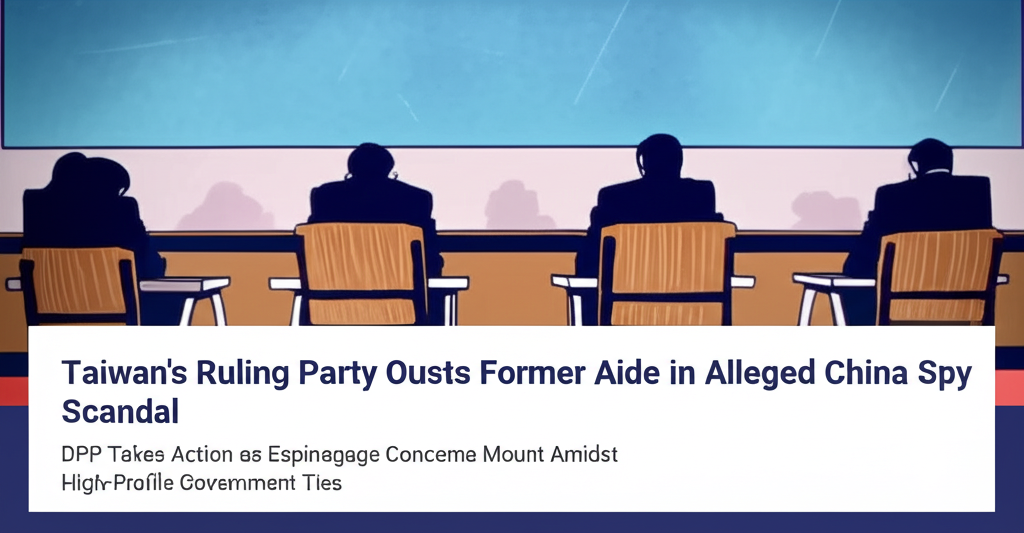Taiwan's Ruling Party Ousts Former Aide in Alleged China Spy Scandal
DPP Takes Action as Espionage Concerns Mount Amidst High-Profile Government Ties

Taipei, April 13 – The ruling Democratic Progressive Party (DPP) in Taiwan has expelled a former assistant to Joseph Wu (吳釗燮), now the nation's national security chief, over allegations of involvement in a Chinese espionage case. The incident has sent ripples through Taiwan's political landscape, raising concerns about national security.
The DPP's headquarters in Yilan County announced the expulsion on Sunday following an emergency meeting to address the case. The individual in question, Ho Jen-chieh (何仁傑), reportedly worked for Wu during his tenure as Taiwan's Foreign Minister between 2018 and 2024.
Chiu Chia-chin (邱嘉進), head of the DPP's Yilan headquarters, stated that the decision to expel Ho was unanimous. He cited Ho's alleged actions as severely damaging to the party's reputation and "running counter to the DPP's core values of freedom, democracy, human rights, and the rule of law."
Taipei prosecutors detained Ho on Thursday following a search of his residence, adding another layer of intrigue to the unfolding saga.
The arrest of Ho contributes to a growing list of individuals suspected of spying for Chinese intelligence services while affiliated with high-ranking DPP government officials. The DPP has held power since 2016, making this a significant challenge to its image.
Other individuals implicated in the case include Wu Shang-yu (吳尚雨), who worked as an advisor in President Lai Ching-te's (賴清德) office; Chiu Shih-yuan (邱世元), former deputy head of the DPP's Taiwan Institute of Democracy, and Huang Chu-jung (黃取榮), assistant to DPP New Taipei Councilor Lee Yu-tien (李余典).
According to prosecutors, Huang is believed to have been recruited by Beijing's intelligence services during his business dealings in China.
Prosecutors allege that after his return to Taiwan, Huang allegedly collaborated with Ho, Wu Shang-yu, and Chiu to collect sensitive information about President Lai and other prominent government officials.
According to a Chinese-language Liberty Times report on Sunday, Wu first hired Ho when he began his tenure as National Security Council (NSC) secretary-general under then President Tsai Ing-wen (蔡英文) in May 2016.
Prior to his recruitment, Ho reportedly passed background and security checks conducted by the National Security Bureau and the Ministry of Justice's Investigation Bureau.
However, the Liberty Times report indicates that Ho was not subjected to further, more comprehensive vetting, thus lacking authorization to access highly classified information.
Subsequently, Ho accompanied Wu to the Ministry of Foreign Affairs (MOFA) when Wu assumed the role of Taiwan's Foreign Minister in February 2018.
MOFA reports that Ho concluded his employment as Wu's assistant in March 2024, just two months before Wu transitioned from his foreign minister post to become the NSC secretary-general again under President Lai Ching-te (賴清德).
The Liberty Times cited anonymous sources familiar with the case, highlighting a potential weakness in the government's background and security check system. They suggest that improvements are warranted.
When approached for comment, MOFA stated on Sunday that standard background and security checks were conducted on Ho before his employment as a contract-based assistant to then-Foreign Minister Wu.
However, MOFA confirmed that Ho was not required to undergo more stringent high-level vetting, which is obligatory for all high-level diplomats.
MOFA emphasized that it regularly reviews all personnel, including contract-based workers, in compliance with the Public Functionaries Merit Evaluation Act and relevant ministry regulations.
